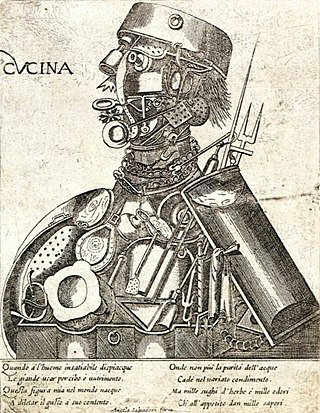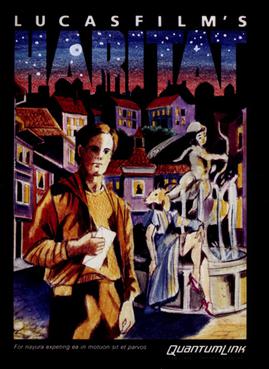
AOL is an American web portal and online service provider based in New York City, and a brand marketed by Yahoo! Inc.

Cyberspace is an interconnected digital environment. It is a type of virtual world popularized with the rise of the Internet. The term entered popular culture from science fiction and the arts but is now used by technology strategists, security professionals, governments, military and industry leaders and entrepreneurs to describe the domain of the global technology environment, commonly defined as standing for the global network of interdependent information technology infrastructures, telecommunications networks and computer processing systems. Others consider cyberspace to be just a notional environment in which communication over computer networks occurs. The word became popular in the 1990s when the use of the Internet, networking, and digital communication were all growing dramatically; the term cyberspace was able to represent the many new ideas and phenomena that were emerging. As a social experience, individuals can interact, exchange ideas, share information, provide social support, conduct business, direct actions, create artistic media, play games, engage in political discussion, and so on, using this global network. Cyberspace users are sometimes referred to as cybernauts.
ICQ was a cross-platform instant messaging (IM) and VoIP client. The name ICQ derives from the English phrase "I Seek You". Originally developed by the Israeli company Mirabilis in 1996, the client was bought by AOL in 1998, and then by Mail.Ru Group in 2010.

The term chat room, or chatroom, is primarily used to describe any form of synchronous conferencing, occasionally even asynchronous conferencing. The term can thus mean any technology, ranging from real-time online chat and online interaction with strangers to fully immersive graphical social environments.
An internet relationship is a relationship between people who have met online, and in many cases know each other only via the Internet. Online relationships are similar in many ways to pen pal relationships. This relationship can be romantic, platonic, or even based on business affairs. An internet relationship is generally sustained for a certain amount of time before being titled a relationship, just as in-person relationships. The major difference here is that an internet relationship is sustained via computer or online service, and the individuals in the relationship may or may not ever meet each other in person. Otherwise, the term is quite broad and can include relationships based upon text, video, audio, or even virtual character. This relationship can be between people in different regions, different countries, different sides of the world, or even people who reside in the same area but do not communicate in person.

Instant messaging (IM) technology is a type of synchronous computer-mediated communication involving the immediate (real-time) transmission of messages between two or more parties over the Internet or another computer network. Originally involving simple text message exchanges, modern IM applications and services tend to also feature the exchange of multimedia, emojis, file transfer, VoIP, and video chat capabilities.

CompuServe, Inc. was an American online service, the first major commercial one in the world. It opened in 1969 as a timesharing and remote access service marketed to corporations. After a successful 1979 venture selling otherwise under-utilized after-hours time to Radio Shack customers, the system was opened to the public, roughly the same time as The Source.
Cybersex, also called computer sex, Internet sex, netsex, e-sex and, colloquially, cyber or cybering, is a virtual sex encounter in which two or more people have long distance sex via electronic video communication and other electronics connected to a computer network.

Online chat is any kind of communication over the Internet that offers a real-time transmission of text messages from sender to receiver. Chat messages are generally short in order to enable other participants to respond quickly. Thereby, a feeling similar to a spoken conversation is created, which distinguishes chatting from other text-based online communication forms such as Internet forums and email. Online chat may address point-to-point communications as well as multicast communications from one sender to many receivers and voice and video chat, or may be a feature of a web conferencing service.

A virtual community is a social work of individuals who connect through specific social media, potentially crossing geographical and political boundaries in order to pursue mutual interests or goals. Some of the most pervasive virtual communities are online communities operating under social networking services.

Yahoo! Messenger was an advertisement-supported instant messaging client and associated protocol provided by Yahoo!. Yahoo! Messenger was provided free of charge and could be downloaded and used with a generic "Yahoo ID" which also allowed access to other Yahoo! services, such as Yahoo! Mail. The service also offered VoIP, file transfers, webcam hosting, a text messaging service, and chat rooms in various categories.
This page provides an index of articles thought to be Internet or Web related topics.

eWorld was an online service operated by Apple Inc. between June 1994 and March 1996. The services included email, news, software installs and a bulletin board system. Users of eWorld were often referred to as "ePeople."

Habitat is a massively multiplayer online role-playing game (MMORPG) developed by LucasArts. It is the first attempt at a large-scale commercial virtual community that was graphic based. Initially created in 1985 by Randy Farmer, Chip Morningstar, Aric Wilmunder and Janet Hunter, the game was made available as a beta test in 1986 by Quantum Link, an online service for the Commodore 64 computer and the corporate progenitor to AOL. Both Farmer and Morningstar were given a First Penguin Award at the 2001 Game Developers Choice Awards for their innovative work on Habitat. As a graphical MUD it is considered a forerunner of modern MMORPGs unlike other online communities of the time. Habitat had a GUI and large user base of consumer-oriented users, and those elements in particular have made Habitat a much-cited project and acknowledged benchmark for the design of today's online communities that incorporate accelerated 3D computer graphics and immersive elements into their environments.
24 Hours in Cyberspace was "the largest one-day online event" up to that date, headed by photographer Rick Smolan with Jennifer Erwitt, Tom Melcher, Samir Arora and Clement Mok. The project brought together the world's top 1,000 photographers, editors, programmers, and interactive designers to create a digital time capsule of online life."
The term Trustworthy Computing (TwC) has been applied to computing systems that are inherently secure, available, and reliable. It is particularly associated with the Microsoft initiative of the same name, launched in 2002.
Identity tourism refers to the ways in which travel ties into different dimensions of identity. It covers travel motivated by interest in ones own or others' racial, ethnic, socioeconomic, sexual or gender identity. It also concerns the construction of cultural identities and re-examination of one's ethnic and cultural heritage via tourism.</ref>

Cyberethics is "a branch of ethics concerned with behavior in an online environment". In another definition, it is the "exploration of the entire range of ethical and moral issues that arise in cyberspace" while cyberspace is understood to be "the electronic worlds made visible by the Internet." For years, various governments have enacted regulations while organizations have defined policies about cyberethics.

WebChat Broadcasting System, or WBS for short, is a virtual community created during the 1990s. Supported by online advertising, it was one of few services at the time to offer free integrated community services including chat rooms, message boards, and free personal web pages. Extremely popular during the mid to late 1990s in the era prior to the Dot-com bust, WBS was at that time the largest and best-known social media website on the internet. In 1998, WBS was acquired by the search engine Infoseek, which was in turn acquired by Disney/ABC. The original WebChat Broadcasting System closed on 15 September 1999 after its chat rooms were integrated into Disney's existing Go Network chat rooms. A revival of WBS was launched in 2009 and is virtually identical to the original community.

MSN Dial-up is an Internet service provider operated by Microsoft in the United States and formerly also in several other countries. Originally named The Microsoft Network, it debuted as a proprietary online service on August 24, 1995, to coincide with the release of Windows 95. In 1996 and 1997, a revised web-based version of the ISP was an early experiment at interactive multimedia content on the Internet.












